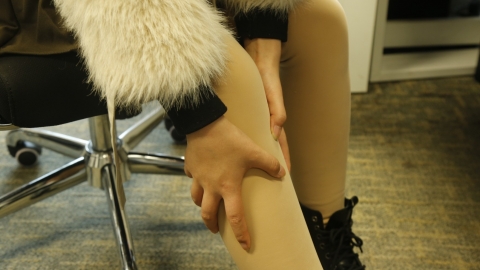Why do my feet go numb from sitting for a long time?
Generally, prolonged sitting leading to foot numbness may be caused by improper posture, localized pressure, lack of exercise, peripheral neuropathy, lumbar disc herniation, and other related factors. Symptomatic management through general treatments and medication may be necessary. If discomfort persists, it is recommended to seek timely medical attention and undergo appropriate treatment under a physician's guidance. Detailed explanations are as follows:

1. Improper Posture
Maintaining the same sitting posture for an extended period, such as crossing legs or slouching, may compress the sciatic nerve or lower limb blood vessels, causing impaired blood circulation and nerve compression, which can lead to foot numbness. This may be accompanied by discomfort such as prickling or soreness. It is recommended to adjust sitting posture, keep the back straight, place both feet flat on the floor, and avoid maintaining the same posture for long periods.
2. Localized Pressure
Prolonged external pressure on the feet or legs, such as wearing tight shoes or pressure on the feet while sitting for long periods, may also cause foot numbness. The affected area may be accompanied by symptoms such as pain and swelling. It is recommended to choose appropriate footwear and maintain proper sitting posture. After experiencing pressure, gentle massage or warm compresses may help improve blood circulation.
3. Lack of Exercise
Insufficient physical activity may reduce lower limb muscle movement, slow blood circulation, and decrease blood supply to nerve endings, making foot numbness more likely. It may also be accompanied by feelings of heaviness and fatigue in the legs. It is recommended to increase daily physical activity, such as walking around periodically, and perform simple lower limb exercises like rising onto the toes and rotating the ankle joints to promote blood circulation and relieve foot numbness.
4. Peripheral Neuropathy
Peripheral neuropathy typically occurs when peripheral nerves are affected by infection, toxins, metabolic disorders, or other factors, potentially leading to nerve dysfunction and symptoms such as limb numbness and tingling. In addition to foot numbness, symptoms such as muscle weakness and abnormal sensations may also occur. It is recommended to follow a physician's guidance to use medications such as carbamazepine tablets, oxcarbazepine tablets, or gabapentin capsules for treatment.
5. Lumbar Disc Herniation
In lumbar disc herniation, the protruding disc tissue may compress adjacent nerve roots, potentially causing nerve conduction disturbances and numbness in the lower limbs, especially the feet. It may also be accompanied by low back pain and radiating pain in the lower limbs. It is recommended to use medications such as Gentongping Granules, Yaotongning Capsules, or Duhuo Jisheng Pills according to medical advice to alleviate symptoms.
It is also recommended to perform simple foot exercises regularly, such as rotating the ankles clockwise and counterclockwise 10–15 times each, multiple times daily, which may help relieve symptoms.




